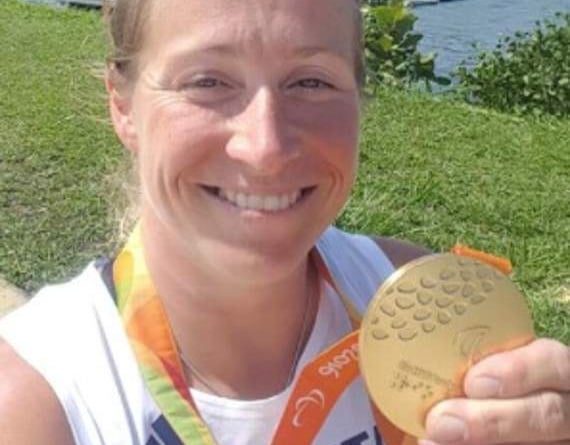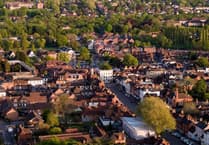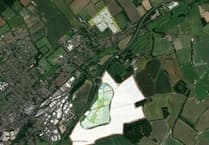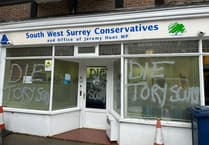FARNHAM residents including a double Paralympic champion, a long-time servant of the community and owner of the world’s largest man-made crater have been recognised in the Queen’s New Year’s Honours List.
Rachel Morris, who won her second Paralympic gold medal in as many sports at the 2016 Rio Games; Janet Maines, chairman of the 40 Degreez youth centre board of trustees and a former Mayor of Farnham and Waverley; and Richard Dunning who owns the Lochnager Crater on the Somme battlefield in France, were all named Member of the Most Excellent Order of the British Empire (MBE) this week.
Rachel’s award, for services to rowing, comes just weeks after she was named World Rowing’s Para Rower of the Year having won the arms-shoulders single scull event in Rio last summer - adding to her Paralympic gold won in hand cycling at the 2008 Beijing Games.
The 37 year old told The Herald: “I’m really proud and so happy to be acknowledged in this way. No athlete sets out to achieve something like this, but when your achievement and journey is recognised it makes it mean something on a deeper level as your career and results have affected other people.
“My family and those very close to me as part of my Paralympic journey are very proud and I’ve had some really wonderful messages from family around the world and coaches and physios etcetera who have been an integral part of my medals, highs and lows.”
Farnham MP and Health Secretary Jeremy Hunt, with whom Rachel has helped establish the Waverley Para Games for children with special needs in recent years, added: “Rachel’s life story is an inspiration to every young person in Farnham who feels things are not going well.
“She didn’t just cope with the horrific misfortune of losing her legs, she turned adversity into triumph by becoming a gold medal winner in two different sports at two different Paralympic games.
“We are all so thrilled she has been recognised and continues to support our community with countless visits to schools, and her leadership role in the Waverley Para Games which is going from strength to strength.”
Another Farnham resident, Janet Maines, was recognised for services to the community having served as a town, borough and county councillor in Farnham since the early 1990s, as well as the Mayor of Farnham in 2000/01, Mayor of Waverley in 2004/05 and the first ever female president of the Rotary Club of Farnham in 2009/10.
She has also served as a governor of various local schools including Hale and The Abbey, and has overseen the development of The Bungalow community centre and children’s centre in Sandy Hill, as well as the 40 Degreez youth centre in Dogflud Way.
Janet, who shows no signs of slowing down despite reaching her mid-70s, said: “It’s a bit humbling, but I’m very happy about it I must say. My family are delighted, particularly my two granddaughters who fancy having a visit up to somewhere royal!
“I’m proud of a lot of things, but in particular the Sandy Hill estate because it was such a run-down area when I first became a councillor but it’s a different place now, it hasn’t got that stigma that it had before.
“For me it’s always been about helping people who need a bit of extra help. But anything I’ve done has not been just me, it’s always been working with other partners and organisations and people.”
Eve Baker, 40 Degreez’s admin, marketing and fundraising manager, added: “Janet has been at the helm of 40 Degreez leading with vision and sensitivity as chairman for 10 years.
“Right from the start Janet realised the importance of working in unity and in partnership with community members and her work has yielded great fruit for all those different organisations but maybe especially for 40 Degreez.”
Richard Dunning, 73, from Seale, was also appointed an MBE for services to First World War remembrance, related to his ownership and preservation of the Lochnagar Crater in La Boisselle, France.
The crater was created by 27 tonnes of high explosive secretly planted under the German lines by the Royal Engineers and detonated at 7.28am on the fateful first morning of the Battle of the Somme, on July 1, 1916.
Half a century later, in 1972, Mr Dunning came across the vast 98ft-deep and 330ft-wide crater soon before it was set to be filled in and reclaimed as farm land, and decided to purchase the land and preserve it as a lasting memorial to the thousands killed in the Great War.
It now welcomes some 200,000 visitors a year, including many school children and relatives of those who fell at the Somme.
Responding to his MBE, Mr Dunning said: “When I bought the place in 1978, the BBC did a little piece on the radio about it and I received 600 letters in just over a week, including 150 from old boys who were there during the war and I got to know them all pretty well.
“I feel fairly unworthy because an awful lot of people come and help every year to preserve the crater, but if it helps to raise the profile of the crater in order to get their stories told, in my mind that’s what it’s all about.”




